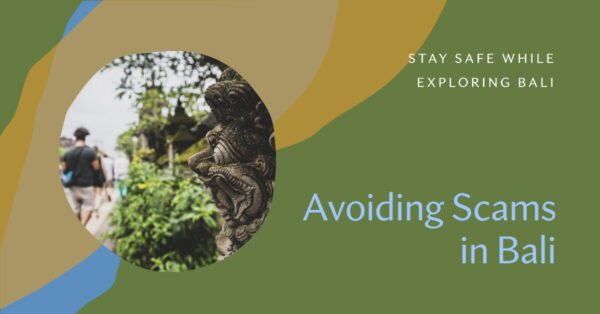Bali is often called a tropical paradise and top destination for travelers drawn to its beautiful beaches, rich culture, and friendly locals. However, with so many visitors flocking to this Indonesian island, there are inevitably some people looking to take advantage through common travel scams.
Tourists need to be aware of the most prevalent scams in Bali to avoid falling victim and fully enjoy their vacation. This article will highlight 10 common scams in Bali and provide tips to steer clear of them.
1. Fake Blue Bird Taxis

Blue Bird Taxi is Bali’s largest and most reputable taxi company, known for its reliable metered fares. However, many unaffiliated cabs mimic Blue Bird’s distinctive blue color scheme and bird logo to deceive tourists.
These imposter taxis often refuse to use the meter, dramatically overcharging for rides. In some cases, they may take circuitous routes or even refuse to let passengers out unless they pay an exorbitant fare. Fake Blue Bird drivers may claim the meter is “broken” or demand a flat rate as much as 3-4 times higher than the actual fare.
Tips to identify genuine Blue Bird taxis and avoid fakes:
- Check for the official “Blue Bird Group” logo on the windshield
- Confirm there is a visible taxi meter inside
- See if the driver’s ID card is displayed
- Make sure the taxi has an official Blue Bird license plate
- Book via the official Blue Bird app for added security
I once made the mistake of getting into a fake Blue Bird taxi from the airport. The driver claimed the meter was broken and asked for double the reasonable fare. I tried negotiating but ended up paying more than I should have.
2. Closed Attractions and Entrance Fee Scams

Scammers often wait near popular tourist sites and temples to trick visitors into believing an attraction is closed or has raised its entrance fee. They will then offer to take the tourists to another site for an additional fee.
Sometimes the drivers will claim new “taxes” have been implemented and try to charge extra to enter places that have normal fixed entrance fees. The closed attractions they steer tourists to frequently turn out to be underwhelming or a front to sell overpriced goods.
Strategies to confirm real attraction status and official ticket prices:
- Check official tourism sites for opening hours and ticket prices
- Ask the ticket window or staff if unsure of an attraction’s status
- Be wary of “guides” approaching you about closures or extra fees
- Politely decline additional offers for other sites or tours
3. Overcharging by Rideshare Drivers

Rideshare apps like Grab and Gojek offer affordable and secure transportation in Bali. However, some drivers take advantage of tourists by refusing to turn on the meter or demanding inflated prices.
They may claim the app is not working properly and ask for an exorbitant flat rate instead. In other cases, drivers have threatened to strand passengers mid-route unless the tourist pays a hugely inflated fare.
Advice on using official ride-hailing apps and confirming prices before the trip:
- Double check the ride details like driver photo before getting in
- Ask the driver to show the ride and fare details on their app
- Politely request the meter be turned on before departing
- Understand the standard rates to your destination from research
- Report issues immediately to the rideshare company
4. Overpriced Taxi Rides

Some independent taxi drivers in Bali are notorious for overcharging tourists without good reason. Common tricks include tampering with or refusing to turn on the meter, taking longer routes to destinations, and demanding extra “fees.”
In busy areas like Kuta or Seminyak, taxis may claim a minimum flat rate charge. Drivers may also state they do not have change and expect tourists to let them keep the difference or round up the fare.
How to negotiate fares or use metered taxis to avoid being overcharged:
- Confirm the taxi has a working meter before getting in
- Politely request the driver to turn on the meter
- Understand standard taxi rates from research
- Specify you want to go by meter and are aware of reasonable fares
- If they refuse, negotiate a fair rate before departing or find another taxi
- Pay the exact metered fare and request change from larger bills
5. Scooter Rental Scams

Many tourists rent a scooter or motorbike to conveniently explore Bali’s winding roads and lush countryside. However, devious rental companies often scam customers.
Some common tactics include blaming pre-existing damage on the renter, refusing to provide helmets by law, stealing rented scooters using duplicate keys, and massively inflating repair costs for minor scratches.
Prevention tips like taking photos before rental and using reputable companies:
- Thoroughly photograph any existing damage before renting
- Check consumer reviews of rental companies
- Only leave deposits via traceable payment methods
- Use reputable agencies found via hotel or tourism recommendations
- Lock parked scooters and keep duplicate keys safe
- Drive carefully and wear a helmet to avoid valid damage claims
6. Corrupt Police Officers

In Bali, police officers frequently stop foreigners riding scooters or motorbikes for claimed violations like missing mirrors or improper paperwork. Even when all documents are legally valid, they leverage petty “offenses” as a chance to solicit bribes.
The corrupt officials may issue fictional tickets, aggressively threaten steep fines that will “be reduced with payment now,” or demand tourists visit an ATM to pay an amount they decree on the spot. They count on intimidating visitors unfamiliar with proper legal procedures.
Advice on adhering to local laws and handling encounters with law enforcement:
- Confirm all rental papers and legally required gear like helmets before driving
- Politely request to see any violation in writing while cooperating fully
- If issued a ticket, request to pay the documented fine at the nearest police station
- Never surrender your license or passport as collateral for payment
- Contact your embassy if coercion for bribes persists after obeying officers
I once encountered police trying to fine me 200,000 IDR for not wearing an “official” helmet. I politely refused to pay and contacted my travel insurance company, after which the officers let me go with a warning.
7. Arak Containing Methanol
Arak is a popular traditional alcoholic drink in Bali that tourists often try during their stay. However, some small batch distillers use toxic methanol in their Arak instead of safer ethanol.
Consuming methanol can have deadly consequences, causing blindness, organ failure, and even death if untreated. Early symptoms tourists should watch for include blurred vision, nausea, abdominal pain, difficulty breathing, and headaches after consuming local spirits like Arak. Seeking immediate medical treatment can save lives and mitigate long-term health impacts.
Recommend purchasing alcohol from reputable sources and recognizing symptoms of methanol poisoning:
- Only buy Arak and other liquor from licensed restaurants, bars, and retailers
- Be very wary of cheap Arak sold in small roadside shops or by individual sellers
- Seek medical help immediately if symptoms like blurred vision, nausea, or breathing issues occur after consuming Arak or local spirits
- Alert establishments serving tainted alcohol so they can remove it and warn other tourists
8. Using Drugs

Some tourists are offered drugs like marijuana or cocaine during their stay in Bali. However, Indonesia has extremely strict anti-drug laws, with harsh penalties for even tiny amounts of narcotics.
Possession of drugs can lead to years in prison or even the death penalty for large quantities. Dealers and scammers exploit tourists’ lack of awareness of the severe legal consequences and intentionally target party hotspots.
Emphasize the severe penalties and advise against any involvement with drugs:
- Politely decline and walk away if locals offer you drugs in Bali – it’s extremely risky
- Be very wary of strangers striking up conversations about buying or using drugs
- Do not agree to transport or hold anything for newly made “friends”
- Note that bribery attempts rarely work within the Indonesian justice system
- The legal process strongly disadvantages foreigners once accused
However, complex social problems and economic disparity underpin aspects of Bali’s drug trade. While tourists should avoid any drug use or transactions, there are also risks of exploitation or becoming unknowing drug mules for local syndicates. All travelers should take care in conversations with strangers touting drugs or illegal activities in Bali’s nightlife areas.
9. Overpriced Goods and Services

Overcharging for goods and services is rampant across tourist hotspots in Bali. From sarong and souvenir sellers to restaurants, masseuses, and taxi drivers, tourists often report being charged 2-3 times the going rate.
Vendors start with an outrageous price and gradually “bargain down” to a still-inflated amount compared to what locals pay. Overpricing is prevalent in busy areas like Kuta, Seminyak, and Ubud, where staff earn commissions trying to dupe tourists.
Tips on researching average prices and bargaining to avoid paying exorbitant rates:
- Discreetly check prices at a few vendors before purchasing
- Politely counter higher quoted prices by stating expected local rates
- Be prepared to walk away rather than overpay if bargaining fails
- Use rideshare apps, reputable metered taxis, or agree on fares beforehand
- Leverage free Wi-Fi to quickly search average costs of items
After getting quotes from a few vendors, I was able to talk down the starting price for a wooden mask from 500,000 IDR to 200,000 IDR, much closer to the actual value.
10. Currency Exchange and ATM Scams

Money changers, currency exchange counters, and even ATMs frequently scam tourists in Bali. Dishonest money changers may rig transactions to shortchange customers of small amounts that add up. I once lost $50 at a dodgy money changer in Legian when the staff deliberately diverted my attention.
Meanwhile, ATM scammers install devices to “skim” debit card details and PINs, draining bank accounts using cloned cards. Using unauthorized payment terminals, they can also manipulate withdrawal limits and hide extra charges.
Recommend using reputable money changers like BMC and secure ATMs:
- Search for recommended money changers like BMC with transparent rates
- Inspect ATMs carefully before inserting your card and check for attached devices
- Cover the keypad when entering PINs and check no cameras are spying
- Use ATMs located inside reputable bank branches when possible
- Check bank statements regularly and notify institutions of any unauthorized charges
Conclusion
While scams in Bali target the millions of annual visitors, being aware of the most common tricks helps travelers avoid potential pitfalls. Remaining vigilant to overcharging vendors, questionable taxi drivers, dubious police, shady scooter rentals, and risks around drugs allows tourists to focus on enjoying Bali’s spectacular culture and island paradise.
Reporting scams to authorities and tourism groups also helps warn future visitors and gradually reduces the problem through pressure on local officials. With simple preventative measures, savoring Bali’s spirituality, natural serenity, and Balinese hospitality can remain every traveler’s delight.

